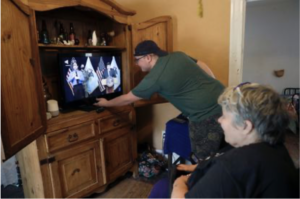Commentary: Small towns, suburbs need more federal coronavirus aid

By Raja Krishnamoorthi
The coronavirus pandemic knows no boundaries. Nor should the federal government’s efforts to fight it.
Congress recently passed bipartisan legislation to replenish assistance to our nation’s small businesses, with new measures expanding access to the smallest ones. That bill also contained aid for our nation’s hospitals and, for the first time, funds for the testing regime necessary to reopen our economy.
What that legislation lacked, however, was any additional help for state and local governments that are suffering from a combination of higher costs to fight the pandemic and cratering sales and other tax revenue. Congress must address this crisis in its next coronavirus aid package. And this time, it must include suburbs and smaller towns that, so far, have been left out.
In its initial response to COVID-19 — the CARES Act — Congress included $150 billion in aid to states and cities with 500,000 residents or more. That aid was warranted because we recognized the impact of the coronavirus on state governments and large cities suffering the brunt of the pandemic — places such as New York City, Detroit, New Orleans and Chicago.
As the spread has worsened, and the number of those infected has risen, additional federal aid to state and local governments has become necessary — just as we have replenished the aid initially provided to small businesses. We also need to expand the targets of that assistance to those jurisdictions that have been ineligible up to now.
No part of our nation has been spared the effects of the pandemic. In the district that I represent, consisting of Chicago’s western and northwestern suburbs, local governments have suffered the same combination of increased demand for services like ambulances, paramedics and public health programs, and a collapsing revenue base. By April 25, the Cook County suburbs alone reported almost 12,000 cases of COVID-19 and more than 550 deaths — more cases and fatalities than in many states. Yet, because none of those suburban communities has a population approaching 500,000, they have been excluded from receiving any direct federal aid.
This problem extends to Downstate cities as well. My hometown of Peoria, whose budget was balanced a mere two months ago, now faces a deficit of $50 million. Roughly half of Peoria’s budget is generated by sales taxes. Now, it is faced with cutting its workforce by more than 150 at the same time the pandemic is increasing the demand on city services. But because its population is roughly 111,000, Peoria was not eligible for prior federal aid.
Outside of Chicago, no city in Illinois approaches a population of 500,000. Yet all of our cities and major suburbs have suffered the severe economic impact of COVID-19 and need federal help. The requirement of a half-million residents for federal aid leaves them out.
It’s important that federal assistance for these smaller jurisdictions not come at the expense of the states and large cities that need additional help too. So far, the coronavirus pandemic has cost Illinois an estimated $7 billion over the next two fiscal years. Cook County estimates it will take a $200 million budget hit. With unemployment soaring, these deficits are beyond the capacity of local taxpayers to make up. And it is precisely the wrong time for tax hikes or huge cuts in the social safety net.
To their credit, Gov. J.B. Pritzker and Mayor Lori Lightfoot recognize that we’re all in this together. Both have called for expanding federal aid to municipalities of all sizes. According to the governor, “Smaller cities and towns and counties should be able to benefit” from additional federal aid. Smaller towns “are a vital part of the region,” adds Mayor Lightfoot. “They’re saying ‘we need help too.’”
All of the previous federal coronavirus aid packages have been bipartisan, with near-unanimous approval. Unfortunately, Senate Majority Leader Mitch McConnell recently injected politics into the discussion, belittling plans for more federal aid as a “bailout for Blue states” and suggesting they consider bankruptcy instead. Those remarks have been roundly criticized by Republicans and Democrats alike.
That’s why I remain hopeful that Congress will soon take up — and pass — a coronavirus aid package that will, for the first time, provide needed assistance to states, cities and suburbs across the U.S. If we’re truly “all in this together,” we can’t continue to leave so many out.
U.S. Rep. Raja Krishnamoorthi, a Democrat, represents the 8th Congressional District.
Photo Credit: Jeff Robertson
Source
